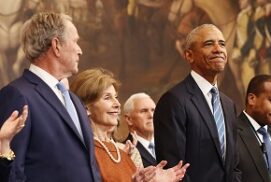In the increasingly surreal second Donald Trump administration, a 29-year-old Salvadoran named Kilmar Abrego Garcia now embodies the most fundamental restructuring of the US constitutional order, arguably in its history. Mr Garcia is being used as a test case for the Trump administration to decouple Americans from the rule of law and protection of courts. His case may be operating at the margins of American society, but its implications potentially represent a redefinition of the relationship between the individual and the US government.
Analyses
United States
- Editorial board in collaboration with AI 17 April 2025A galaxy of intellectuals, theorists, entrepreneurs, and cultural agitators is rewriting the language of the American right. In place of old conservatism, a new vision is taking shape—anti-egalitarian, anti-liberal, and post-democratic—one that looks to both the feudal past and the digital future to imagine a new order: hierarchical, technical, algorithmic. At its center stands the enigmatic figure of Curtis Yarvin.
- Editorial Board 10 April 2025“It is up to all of us to fix this.” In his first public speech since Donald Trump’s return to the presidency, Barack Obama urged Americans to defend democratic values and called on institutions—particularly universities and law firms—to resist the administration’s attacks. “I have deep differences of opinion with my most immediate successor—who’s now president once again,” Obama told students of Hamilton College, without naming Trump directly, “but at least for most of my time, I’d say the post-World War II era, there was a broad consensus between Democrats, Republicans, conservatives, liberals around a certain set of rules where we settle our differences—[…] bonds that transcend party, region, or ideology.”
- Matteo Muzio 20 March 2025Tulsa was the site of the 1921 massacre, the largest racially motivated mass killing in U.S. history. The attack led to the destruction of Greenwood, one of the very few affluent, majority-Black neighborhoods in the entire country at the time. Out of its 11,000 residents, some had accumulated wealth equivalent to a million dollars; six families even owned private planes. Greenwood was known as “Black Wall Street.” Today, under the leadership of Tulsa’s Democratic mayor Monroe Nichols – elected in 2024 – there are plans to rebuild the neighborhood and restore its legacy.
- Hussein Ibish 14 March 2025The administration of US President Donald Trump has left everyone who cares about free speech in the country little choice but to defend and champion Mahmoud Khalil, as he faces the most insidious attack on freedom of conscience in America in at least 60 years.
- Seán Golden 3 March 2025It is extremely difficult to accurately predict what will unfold in Trump’s relations with China or their effects on the rest of the world, but it may be possible to identify and analyze some of the major scenarios in which they will unfold, including the emerging post-Bretton Woods world order, world trade, the role of science, technology, engineering, and mathematics (STEM) in a global setting, and security issues.
- Matias Xerxes Gonzalez Field 3 March 2025USAID has provided resources to over 130 nations, accounting for 42 percent of the humanitarian aid tracked by the United Nations. Until 2023, its funding averaged around 40 billion dollars per year. After cuts to positions and resources, the agency’s budget has now been reduced to approximately 100 million dollars. The freezing and blocking of USAID’s domestic workforce have had the most evident and severe consequences abroad. While the number of workers fired in the US amounts to just over 1,500 employees, the agency employs over 10,000 people around the globe.
- Federica Zoja 15 February 2025“Every day there’s something new. Donald Trump’s political agenda is totally unpredictable: today it’s the Gaza Strip, tomorrow it will be Ukraine!” Sebastien Boussois, an analyst and researcher at the Université Libre de Bruxelles and at Uqam in Montreal, is one of the most authoritative voices in the French-speaking world on the subject of relations between the West and the Gulf States. In the aftermath of Riyadh’s vehement opposition to the American proposal to empty Gaza and rebuild it, his first comment is unequivocal: “It’s all a show, a complete charade! I think that Saudi Arabia, through the voice of its Foreign Minister, is obliged to reject Trump’s proposal for annexation. But also that there is no lasting or solid agreement in the region as strong as the one between the United States and Saudi Arabia: let us remember, it dates back to 1945, after the end of the Second World War.”
- Chandra Mallampalli 12 February 2025At the confirmation hearing of Kash Patel for the position of FBI Director, Senator Thom Tillis introduced him as the son of Indian immigrants from their home state of Gujarat, which he described as a “melting pot” of religions. Patel’s father had fled Uganda during Idi Amin’s expulsion of Indians before ultimately settling the family in New York. Patel displayed his religion and ethnicity alongside his belief in the U.S. Constitution. He saluted his parents by declaring “Jai Sri Krishna,” a greeting that literally means glory or victory to Lord Krishna. If we set aside the grave concerns Democrats raised about Patel’s conspiracy mongering and his ambitions to dismantle the “deep state” by exacting revenge on Trump’s enemies, Patel’s nomination appears to reflect values Democrats would embrace: a commitment to pluralistic democracy, an embrace of racial and cultural differences, and an affirmation of America as a haven for immigrants. But are these the values that drew him to the Trump administration?
- Seán Golden 7 February 2025Trump promised to impose 60 percent tariffs on Chinese trade immediately but has for the moment only imposed 10 percent. Whether this is an attempt to keep face with his voters or a tactical move in a longer-term strategy remains to be seen, as does China’s response and the global consequences. The initial Chinese response has been a cautious tit-for-tat, but the situation is fluid.










